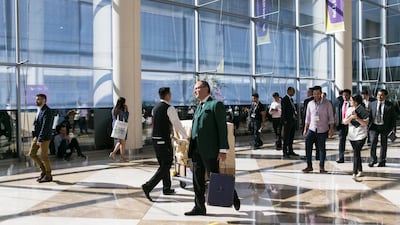Wages are expected to increase by 3.9 per cent in the UAE, a global study from global consulting company Korn Ferry found, with inflation-adjusted salaries rising at 0.7 per cent.
According to the Korn Ferry 2019 Salary Forecast – which calculates actual salary projections to account for inflation estimates and find the real spending power of workers across global markets – the UAE is set for a net positive increase in disposable income, due to an expected inflation rate of 3.2 per cent this year.
“The UAE continues to position itself as a highly attractive workplace destination in the region. Average real salary increases are projected to move back to a positive level after being in negative figures in 2018. At the same time, inflation has halved in the last 12 months and the cost of living is declining, resulting in greater disposable income for workers at all levels,” said Vijay Gandhi, regional director – Europe, Middle East and Africa, at Korn Ferry Products.
_________
Read more:
UAE a 'top-five favourite for expats'
UAE jobseekers look for career development over salaries and perks
UAE salary guide 2019: How much should you be earning?
Financial confidence on the rise for UAE residents
_________
Globally, real-wage salaries are expected to grow an average of 1 per cent this year. This is down from a 1.5 per cent prediction for 2018. With rising inflation in most parts of the world, it means real-wage increases are not as rosy for many employees around the world.
Bob Wesselkamper, global head of rewards and benefits solutions at Korn Ferry, said that, while the figures vary according to role, industry, country and region, “one thing is clear, on average, employees are not seeing the same real pay growth they did even one year ago”.
Middle East wages are expected to increase by 3.6 per cent, compared to 3.8 per cent last year, according to the study, which draws on the data of 20 million job holders from HR leaders across 100 countries. It found that Inflation-adjusted wage increases are predicted to be 0.4 per cent, compared to 0.9 per cent last year and 2.5 per cent the year before.
While the study shows the Middle East rank as the second-lowest region globally in terms of real salary increase, key markets such as the UAE, Saudi Arabia and Kuwait are expected to see an improved overall performance in 2019.
The UAE’s real-wage growth of 0.7 per cent this year is an improvement on 2018 when higher inflation rates – due in part to the introduction of VAT – saw real wages expected to fall into the negative range (minus 0.5 per cent) in 2018.
Meanwhile, Saudi Arabia is expected to see the highest real salary increase this year. With the inflation rate anticipated to increase by 2.3 per cent and salaries by 4.9 per cent, the real salary increase is predicted at 2.6 per cent - a higher figure than the 0.1 per cent rise forecast for 2018.
_________
Read more:
UAE employees can expect a 4.8 per cent pay rise next year
A fifth of UAE expatriates doubled their salary when they relocated
UAE economy growth drives 'war on talent' for tech professionals
A fifth of UAE expatriates doubled their salary when they relocated
________
Similarly, Kuwait – which ranks second highest in the region – has a projected average real salary increase of 2.2 per cent based on an inflation rate forecast of 1.6 per cent and expected salary increase of 3.8 per cent.
Lebanon, on the other hand, is expected to see a drop in real wages of 1.7 per cent. This is compared to 1.8 per cent growth in Lebanon last year and a 6.1 per cent growth the year before.
“While the Middle East continues to face a similar inflationary pressure as we are seeing across the globe, key financial centres should see improved performance in 2019. Saudi Arabia and Kuwait are expected to outpace the region in terms of real salary increases, with both showing significant year-on-year increases,” said Mr Gandhi.
The highest real-wage growth in 2019 will be found in Asia where salaries are forecast to increase by 5.6 per cent, up from 5.4 per cent last year. Inflation-adjusted real wage increases are expected to be 2.6 per cent, the highest globally, but down from 2.8 per cent last year.
A November study from global consulting company Mercer found that UAE salaries are expected to rise by 4.8 per cent in 2019, although this figure did not factor in inflation.
However, according to a January study from global recruitment consultancy Michael Page, salary increases are no longer enough to attract and retain the best candidates in the UAE. Instead employees prioritise other work benefits such as career development, organisational culture and flexibility.


